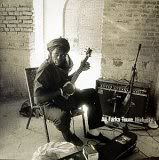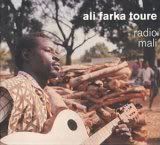 Ali Ibrahim "Farka" Toure.. (October 31, 1939 - March 6, 2006) was born in 1939 in Gourmararusse (in the Timbuktu region), Mali, into the noble Sonhai family. Ali, was the tenth son of his mother but the only one to survive past infancy. He was descended from the ancient military force known as the Arma, and was ethnically related to the Songrai (Songhai) and Peul peoples of northern Mali.
Ali Ibrahim "Farka" Toure.. (October 31, 1939 - March 6, 2006) was born in 1939 in Gourmararusse (in the Timbuktu region), Mali, into the noble Sonhai family. Ali, was the tenth son of his mother but the only one to survive past infancy. He was descended from the ancient military force known as the Arma, and was ethnically related to the Songrai (Songhai) and Peul peoples of northern Mali.Being of noble birth, he wasn't supposed to have have taken up music. His family disapproved because the musician profession is normally inherited in Malian society. However, having an independent and strong willed character, once he decided to take up music, there was no stopping him. This should come as no surprise, when he was a baby, his parents nicknamed him "Farka" , meaning the donkey, symbolising a strong, rugged determination.
He began playing the gurkel in 1950. This is a single string African guitar that he chose because of its power to draw out the spirits. He also taught himself the njarka, a single string fiddle that is used often in his performances. Then in 1956, Ali Farka Toure saw performance by the great Guinean guitarist Keita Fodeba in Bamako in 1956 and was heavily influenced to become a guitarist. He taught himself to adapt traditional songs to the guitar using the techniques he had learned on the gurkel.
As the first African bluesman to achieve widespread popularity on his home continent, Tour.. was often known as "the African John Lee Hooker". Musically, the many superpositions of guitars and rhythms in his music were similar to R. L. Burnside's hypnotic blues style. He usually sang in one of several African languages, mostly Songhay, Fulfulde, or Tamasheq, as on his breakthrough album, Ali Farka Tour.., which established his reputation in the world music community.
 During a visit to Bamako in the late 1960's, artists such as Ray Charles, Otis Redding and most importantly John Lee Hooker introduced Ali Farka Toure to African-American music. At first, he thought that Hooker was playing Malian music, but then realized that this music coming from America had deep African roots. Ali Farka Toure was also inspired by Hooker's strength as a performer and began to incorporate elements into his own playing. During those years Ali Farka Toure composed, sang and performed with the famous Troupe 117, a group created by the Malian government after the country's independence.
During a visit to Bamako in the late 1960's, artists such as Ray Charles, Otis Redding and most importantly John Lee Hooker introduced Ali Farka Toure to African-American music. At first, he thought that Hooker was playing Malian music, but then realized that this music coming from America had deep African roots. Ali Farka Toure was also inspired by Hooker's strength as a performer and began to incorporate elements into his own playing. During those years Ali Farka Toure composed, sang and performed with the famous Troupe 117, a group created by the Malian government after the country's independence.In 1990, Toure abandoned music in order to tend to his farm, in his native Timbuktu. His producer managed to convince him otherwise and to return to his guitar. 1994's Talking Timbuktu, a collaboration with Ry Cooder, sold promisingly well in western markets and the album won a Grammy award. This success however, was followed by a hiatus from releases in America and Europe.Tour.. is noted as the mentor to popular Malian musician Afel Bocoum.
Despite the success with Talking Timbuktu, Ali Farka Toure wasn't willing to leave his rice farm in Mali to record an album. For the recording of the album Niafunke, Producer Nick Gold had to set up the equipment in an abandoned brick hall in Niafunke, Mali. He as forced to use portable equipment and gasoline generators since Toure's hometown had no power lines. The crew had to wait till Farka Toure was done with his chores on the farm and ready to play the guitar. This was a more traditional album, focusing on African rhythms and beats. Farka Toure said: "We were in the middle of the landscape which inspired the music and that in turn inspired myself and the musicians. . . . In the West, perhaps this music is just entertainment and I don't expect people to understand."
In 2004 Tour.. was elected mayor of Niafunk.. and spent his own money grading the roads, putting in sewer canals and fuelling a generator that provided the impoverished town with electricity as well as tackling the malaria problem, and establishing a tree planting project. Ali has remained extremely loyal to his homeland and spends most of his time in the area, working on his farm.
In September 2005, he released the album In the Heart of the Moon, a collaboration with Toumani Diabat.., for which he received a second Grammy award. Savane, his last album posthumously released in July 2006, was received with wide acclaim by professionals and fans alike. Since September 2006 it has been topping the World Music Charts Europe (WMCE), a chart voted by the leading World Music specialists around Europe. Ali Farka Tour.. has also recently been nominated for the BBC Radio 3 awards 2007.
On 7 March 2006 the Ministry of Culture of Mali announced his death at age 67 in Bamako from bone cancer, against which he had been battling for some time. World Circuit, Ali's record label made a statement that he recorded several tracks with his son Vieux Farka Tour.. for Vieux's debut album. They expect to be released the album in early 2007.
The Malian ministry of culture has recently announced that a homage will be paid to Ali Farka Tour.. in Bamako and Niafunke on March 6, 7 and 8 2007. Activities include conferences, debates and a mega concert in a football stadium attended by the likes of Toumani Diabate, Oumou Sangare, Manu Dibango, Youssou N'dour, Alpha Blondy, Bembeya Jazz, Ry Cooder, Marcus James, Bonnie Raitt, Peter Gabriel, Ramata Diakit.., Boubacar Traor..(Kar Kar), Habib Koit.., Salif Keita, Baaba Maal, Tiken Jah Fakoly, Carlos Santana, Tracy Chapman[1].
Listen to Ali Farka Tour.. on Kemet Music Radio
Discography
Ali Tour.. Farka - 1976 - Sonafric
Special « Biennale du Mali » - 1976 - Sonafric
Biennale - 1978 - Sonafric
Ali Tour.. Farka - 1979 - Sonafric
Ali Tour.. dit Farka - 1980 - Sonafric
Ali Farka Tour.. (Red) - 1984 - Sonodisc/Esperance
Ali Farka Tour.. (Green) - 1988 - Sonodisc/Esperance
Ali Farka Tour.. World Circuit - 1989 - WCD007 / Mango
African Blues - 1990 - Shanachie
The River - 1990 - World Circuit WCD017 / Mango
The Source - 1993 - World Circuit WCD030 / Hannibal with Taj Mahal
Talking Timbuktu - 1994 - World Circuit WCD040 / Hannibal (with Ry Cooder)
Radio Mali - 1996 - World Circuit WCD044 / Nonesuch (remastered selections of original albums from 1975 through 1980)
Niafunke - 1999 - World Circuit WCD054 / Hannibal

No comments:
Post a Comment